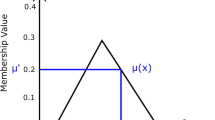Abstract
This paper presents a method to model knowledge in creative environments using dynamic fuzzy ontologies. Dynamic fuzzy ontologies are ontologies that evolve in time to adapt to the environment in which they are used, and whose taxonomies and relationships among concepts are enriched with fuzzy weights (i.e., numeric values between 0 and 1). Such cognitive artifacts can provide for higher user awareness in learning environments, as well as for greater creative stimulus for knowledge discovery. This paper gives the definitions of dynamic fuzzy ontologies, the details of how fuzzy values are dynamically assigned to concepts and relations, and presents an experimental evaluation of the proposed approach.
Preview
Unable to display preview. Download preview PDF.
Similar content being viewed by others
References
Binder, T., Michelis, G.D., Gervautz, M., Jacucci, G., Matkovic, K., Psik, T., Wagner, I.: Supporting configurability in a mixed-media environment for design students. Personal Ubiquitous Comput. 8, 310–325 (2004)
Abowd, G.D., Dey, A.K., Brown, P.J., Davies, N., Smith, M., Steggles, P.: Towards a better understanding of context and context-awareness. In: Gellersen, H.-W. (ed.) HUC 1999. LNCS, vol. 1707, pp. 304–307. Springer, Heidelberg (1999)
Calegari, S., Loregian, M.: Ontologies help finding inspiration: A practical approach in multimedia information management. In: Karagiannis, D., Reimer, U. (eds.) PAKM 2004. LNCS (LNAI), vol. 3336, pp. 307–318. Springer, Heidelberg (2004)
Gruber, T.R.: A translation approach to portable ontology specifications. Knowl. Acquis. 5, 199–220 (1993)
Loregian, M., Telaro, M.: Dynamic ontologies and cooperative learning. In: Supplements to Proceedings of COOP 2004, pp. 73–80 (2004)
Calegari, S., Ciucci, D.: Integrating Fuzzy Logic in Ontologies. In: ICEIS 2006 (in print, 2006)
Mockus, A., Herbsleb, J.D.: Expertise browser: a quantitative approach to identifying expertise. In: ICSE 2002, pp. 503–512. ACM Press, New York (2002)
Raghavan, V.V., Wong, S.K.M.: A critical analysis of vector space model for information retrieval. Journal of the American Society for Information Science 37, 279–287 (1986)
Khang, T.D., Störr, H., Hölldobler, S.: A fuzzy description logic with hedges as concept modifiers. In: Third International Conference on Intelligent Technologies and Third Vietnam-Japan Symposium on Fuzzy Systems and Applications, pp. 25–34 (2002)
Wasserman, S., Faust, K.: Social network analysis. Cambridge University Press, Cambridge (1994)
Marín, N., Pons, O., Miranda, M.A.V.: A strategy for adding fuzzy types to an object-oriented database system. Int. J. Intell. Syst. 16, 863–880 (2001)
Klir, G., Yuan, B.: Fuzzy Sets and Fuzzy Logic: Theory and Applications. Prentice Hall, Englewood Cliffs (1995)
Zadeh, L.A.: Fuzzy sets. Inform. and Control 8, 338–353 (1965)
Singh, S., Dey, L., Abulaish, M.: A framework for extending fuzzy description logic to ontology based document processing. In: Favela, J., Menasalvas, E., Chávez, E. (eds.) AWIC 2004. LNCS, vol. 3034, pp. 95–104. Springer, Heidelberg (2004)
Abulaish, M., Dey, L.: Ontology Based Fuzzy Deductive System to Handle Imprecise Knowledge. In: Tech 2003, pp. 271–278 (2003)
Matheus, C.: Using Ontology-based Rules for Situation Awareness and Information Fusion. In: W3C Workshop on Rule Languages for Interoperability (2005)
Quan, T., Hui, S., Cao, T.: FOGA: A Fuzzy Ontology Generation Framework for Scholarly Semantic Web. In: KDO 2004, pp. 37–48 (2004)
Parry, D.: A fuzzy ontology for medical document retrieval. In: DMWI 2004, pp. 121–126 (2004)
Chang-Shing, L., Zhi-Wei, J., Lin-Kai, H.: A fuzzy ontology and its application to news summarization. IEEE Transactions on Systems, Man, and Cybernetics-Part B: Cybernetics 35, 859–880 (2005)
Monge, P., Contractor, N.: Theory of Communicatin Networks. Oxford University Press, Oxford (2003)
Crowder, R., Gareth Hughes, W.H.: An agent based approach to finding expertise. In: Karagiannis, D., Reimer, U. (eds.) PAKM 2002. LNCS, vol. 2569, pp. 179–188. Springer, Heidelberg (2002)
van der Aalst, W.M.P., Reijers, H.A., Song, M.: Discovering Social Networks from Event Logs. Comp. Supported Coop. Work 14, 549–593 (2005)
Granovetter, M.: The strength of weak ties. American Journal of Sociology 78, 1360–1380 (1973)
Ogata, H., Yano, Y., Furugori, N., Jin, Q.: Computer supported social networking for augmenting cooperation. Comp. Supported Coop. Work 10, 189–209 (2001)
Agrawal, R., Gunopulos, D., Leymann, F.: Mining process models from workflow logs. In: Schek, H.-J., Saltor, F., Ramos, I., Alonso, G. (eds.) EDBT 1998. LNCS, vol. 1377, pp. 469–483. Springer, Heidelberg (1998)
Cook, J.E., Wolf, A.L.: Discovering models of software processes from event-based data. ACM Trans. Softw. Eng. Methodol. 7, 215–249 (1998)
Loregian, M., Matković, K., Psik, T.: Seamless browsing of visual contents in shared learing environments. In: PerComW 2006, pp. 235–239. IEEE Computer Society, Los Alamitos (2006)
De Paoli, F., Loregian, M.: Context-aware Applications with Distributed Ontologies. In: CAiSE (2006) (In print)
Author information
Authors and Affiliations
Editor information
Editors and Affiliations
Rights and permissions
Copyright information
© 2006 Springer-Verlag Berlin Heidelberg
About this paper
Cite this paper
Calegari, S., Loregian, M. (2006). Using Dynamic Fuzzy Ontologies to Understand Creative Environments. In: Larsen, H.L., Pasi, G., Ortiz-Arroyo, D., Andreasen, T., Christiansen, H. (eds) Flexible Query Answering Systems. FQAS 2006. Lecture Notes in Computer Science(), vol 4027. Springer, Berlin, Heidelberg. https://doi.org/10.1007/11766254_34
Download citation
DOI: https://doi.org/10.1007/11766254_34
Publisher Name: Springer, Berlin, Heidelberg
Print ISBN: 978-3-540-34638-8
Online ISBN: 978-3-540-34639-5
eBook Packages: Computer ScienceComputer Science (R0)




